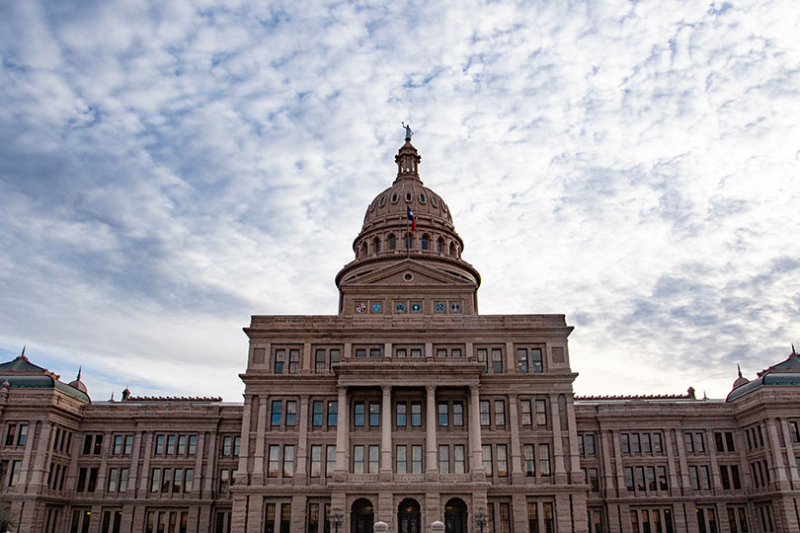By Julie Tomascik
Editor
Texas lawmakers approved several bills during the 88th legislative session that will impact farmers, ranchers and rural Texans.
“This session was successful in strengthening our right to farm and ranch and passing additional liability protections for agriculture,” Texas Farm Bureau (TFB) President Russell Boening said. “It took all of our members working together as the voice of Texas agriculture this legislative session, and I’m proud of the work we did.”
Right to farm and ranch
One of TFB’s priority issues this session was the right to farm.
A constitutional amendment and several bills passed, all aimed at strengthening the ability of farmers and ranchers to thrive in Texas for generations to come.
“The most significant achievement for Texas agriculture during the regular session was the passage of HJR 126 by Rep. DeWayne Burns and Sen. Charles Perry. The constitutional amendment provides important protections in the Texas Constitution for everyday farming and ranching,” Boening said. “Texas voters can support farmers and ranchers and the constitutional amendment with a ‘yes’ vote on Nov. 7. This is a once-in-a-generation opportunity to impact Texas agriculture in such a significant way.”
Other right to farm accomplishments included HB 1750 by Rep. Burns and Sen. Perry that prohibits cities from imposing “governmental requirements” on all agricultural operations within city limits, no matter when the land was annexed by the city. Cities may only impose restrictions on an ag operation if the city can prove, with clear and convincing evidence, that it is necessary to protect the public from imminent danger.
HB 2308 by Rep. Trent Ashby and Sen. Perry strengthens the current protections in law to prevent nuisance lawsuits against agricultural operations.
HB 2271 by Rep. Kyle Kacal and Sen. Lois Kolkhorst revises the Texas Agricultural Code to include “aquaculture” as an “agricultural operation.” Aquaculture operations are due the same benefits, rights and protections as all other agricultural operations.
Truth in labeling
A bill that establishes marketing and labeling requirements for imitation meat products goes into effect Sept. 1.
SB 664 by Sen. Charles Perry and Rep. Brad Buckley addresses meat labels. It states that producers of imitation meat products will be in violation of the new requirements if the food’s labels, brands, images, depictions or graphics misrepresent the food in the package.
The bill implements consistent labels for “analogue products,” which are food products made from processed plant products, insects or fungus with food additives to mimic meat, poultry or egg products.
The bill also addresses cell-cultured products, requiring the products to be labeled as either cell-cultured, lab grown or a similar qualifying term.
Liability protections
TFB once again worked to increase protections for landowners this session.
HB 73 by Rep. Andrew Murr and Sen. Drew Springer prevents landowners from being held liable from damages caused by livestock due to a damaged fence.
It also prevents the landowner from being held liable due to acts of God, wildlife and livestock that are beyond the control of the landowner.
SB 1133 by Sen. Cesar Blanco and Rep. Tracy King also passed, creating a grant program to compensate property owners for damage caused by criminal activity related to border security. The attorney general will establish guidelines and oversee the grant program.
Rural connectivity
Rural connectivity was addressed by several pieces of legislation.
HB 9 by Rep. Trent Ashby and Sen. Joan Huffman creates the Texas Broadband Infrastructure Fund to provide $1.5 billion in state funding to ensure expansion of broadband throughout rural Texas.
HJR 125 by Rep. Ashby and Sen. Huffman provides a constitutional amendment on the Nov. 7 ballot for the creation of the fund and dedication of $1.5 billion in funding.
SB 1710 by Sen. Perry and Rep. Dustin Burrows ensures that support for connectivity throughout rural Texas is continued.
Other bills of interest
The Texas Legislature passed a bill, SB 505, that would impose an annual registration fee for electric vehicles in the state. It goes into effect Sept. 1.
Electric vehicle owners will pay a $400 registration fee for the initial two-year inspection on new vehicles and $200 for an annual registration renewal. Both fees will be deposited to the credit of the state highway fund to maintain roads.
Also effective Sept. 1 is HB 1761, which addresses pesticides.
This bill limits the time a pesticide must be registered after it is no longer sold in Texas. According to the bill, a pesticide can cease registration two years after the registrant stops distributing the pesticide in Texas or the date no pesticide remains in the channels of trade in Texas—whichever comes first. It also allows for a pesticide that has been recalled prior to its registration expiration date, then it does not have to continue to be registered. These changes would bring Texas more in line with other states.
Bills that did not pass
Several bills addressed foreign ownership of land but were not passed by state lawmakers.
Another bill that was unsuccessful this session dealt with energy regulation. SB 624 would have established a regulatory framework for renewable energy projects to help balance the need for additional electricity capacity while addressing private property rights.
TFB-monitored bills
For a legislative overview and details on the bills monitored and supported by TFB this session, visit texasfarmbureau.org/advocacy/austin-newsletter.

